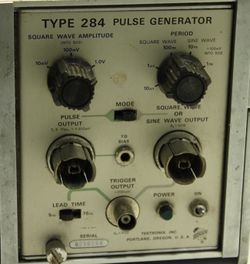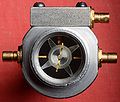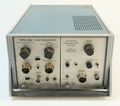284: Difference between revisions
No edit summary |
No edit summary |
||
| Line 1: | Line 1: | ||
{{Instrument Sidebar | |||
|manufacturer=Tektronix | |||
|model=284 | |||
|class=Pulse generator | |||
|series= | |||
|summary=Pulse generator | |||
|image=Tek284-front.jpg | |||
|caption=Tek 284 front | |||
|introduced=1967 | |||
|discontinued=(?) | |||
|designers= | |||
|manuals= | |||
* [http://bama.edebris.com/download/tek/284/Tek%20284_v6.pdf Tektronix 284 Manual (PDF)] | |||
* [http://www.amplifier.cd/Test_Equipment/Tektronix/Tektronix_other/284.html Tek 284 page at amplifier.cd] with detailed internals and repair/cal report | |||
* [[Media:Tek 284 fcp oct 1967.pdf|Tektronix 284 Factory Calibration Procedure, October 1967]] | |||
}} | |||
The '''Tektronix 284''' is a pulse generator [[introduced in 1967|introduced in July 1967]]. | The '''Tektronix 284''' is a pulse generator [[introduced in 1967|introduced in July 1967]]. | ||
Its output modes include: | Its output modes include: | ||
| Line 6: | Line 21: | ||
* Square wave, 10 MHz, 1 MHz or 100 kHz, 10 mV, 100 mV, or 1 V | * Square wave, 10 MHz, 1 MHz or 100 kHz, 10 mV, 100 mV, or 1 V | ||
Only one mode can be used at a time. | Only one mode can be used at a time. The pulse comes out one output connector. The sine wave and square wave come out another output connector. Both outputs are 50 Ω [[GR-874]]. | ||
The pulse comes out one output connector. | |||
The sine wave and square wave come out another output connector. | |||
Both outputs are 50 Ω [[GR-874]]. | |||
The 284 generates a 1 GHz sinewave using a | The 284 generates a 1 GHz sinewave using a [[2N3478]] RF NPN transistor-based oscillator. | ||
[[2N3478]] RF NPN transistor-based oscillator. | |||
The 284 generates the 70 ps risetime pulse using a 20 mA, 1.5 pF tunnel diode, | The 284 generates the 70 ps risetime pulse using a 20 mA, 1.5 pF tunnel diode, D180, Tektronix part number [[152-0329-00]]. | ||
D180, Tektronix part number [[152-0329-00]]. D180 is mounted | D180 is mounted inside of a 50 Ω airline (rigid coaxial transmission line with only air between the center conductor and the shell). | ||
inside of a 50 Ω airline (rigid coaxial transmission line with only air between the center conductor and the shell). | |||
D180 is in series with the airline's center conductor. | D180 is in series with the airline's center conductor. | ||
One end of the airline contains three resistors for biasing the tunnel diode and terminating the transmission line. | One end of the airline contains three resistors for biasing the tunnel diode and terminating the transmission line. | ||
| Line 27: | Line 37: | ||
The tripper pulse is produced by a [[snap-off diode]]. | The tripper pulse is produced by a [[snap-off diode]]. | ||
Air gap capacitors couple the tripper pulse to the tunnel diode. | Air gap capacitors couple the tripper pulse to the tunnel diode. | ||
These capacitors, C185 and C186, are drawn with dashed lines in the schematic | These capacitors, C185 and C186, are drawn with dashed lines in the schematic because they are really just stray capacitances. | ||
because they are really just stray capacitances. | One side of each capacitor is the unconnected center pin of the bulkhead-mount female [[SMB connector]]s in the side of the airline. | ||
One side of each capacitor is the unconnected center pin of the bulkhead-mount female | The other side of the capacitor is the conductive tunnel diode mount in the core of the airline. | ||
[[SMB connector]]s in the side of the airline. The other side of the | |||
capacitor is the conductive tunnel diode mount in the core of the airline. | |||
Modification kit [[040-0487-00]] changes the times selectable with the lead time switch. | Modification kit [[040-0487-00]] changes the times selectable with the lead time switch. | ||
==See Also== | ==See Also== | ||
| Line 58: | Line 62: | ||
[[Category:Pulse generators]] | [[Category:Pulse generators]] | ||
Revision as of 10:00, 18 August 2021
The Tektronix 284 is a pulse generator introduced in July 1967. Its output modes include:
- 70 ps risetime pulse, 200 mV, 50 kHz repetition rate, 1 μs pulse duration (5% duty cycle)
- Sine wave, 1 GHz or 100 MHz, 100 mV
- Square wave, 10 MHz, 1 MHz or 100 kHz, 10 mV, 100 mV, or 1 V
Only one mode can be used at a time. The pulse comes out one output connector. The sine wave and square wave come out another output connector. Both outputs are 50 Ω GR-874.
The 284 generates a 1 GHz sinewave using a 2N3478 RF NPN transistor-based oscillator.
The 284 generates the 70 ps risetime pulse using a 20 mA, 1.5 pF tunnel diode, D180, Tektronix part number 152-0329-00. D180 is mounted inside of a 50 Ω airline (rigid coaxial transmission line with only air between the center conductor and the shell). D180 is in series with the airline's center conductor. One end of the airline contains three resistors for biasing the tunnel diode and terminating the transmission line. The other end of the airline is the GR-874 pulse output connector. For each pulse (every 20 μs):
- the biasing current is switched on, putting D180 close to its peak current
- a capacitively coupled "tripper" applies a short current pulse to D180, causing it to switch to its high-voltage state
- the biasing current is switched off, causing the tunnel diode to fall back to the low-voltage state
The tripper pulse is produced by a snap-off diode. Air gap capacitors couple the tripper pulse to the tunnel diode. These capacitors, C185 and C186, are drawn with dashed lines in the schematic because they are really just stray capacitances. One side of each capacitor is the unconnected center pin of the bulkhead-mount female SMB connectors in the side of the airline. The other side of the capacitor is the conductive tunnel diode mount in the core of the airline.
Modification kit 040-0487-00 changes the times selectable with the lead time switch.
See Also
Photos
-
-
-
-
-
-
-
Tunnel diode in housing
-
Oscillator
-
Fast pulse output schematic
-
Pulser module drawing
-











